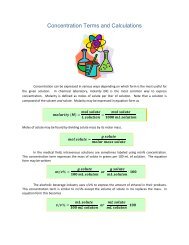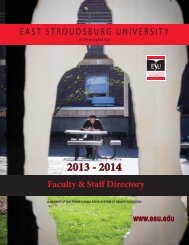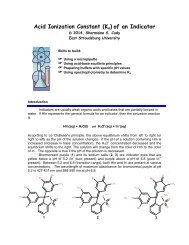Orgon's Obsession in Moliere's Tartuffe
Orgon's Obsession in Moliere's Tartuffe
Orgon's Obsession in Moliere's Tartuffe
Create successful ePaper yourself
Turn your PDF publications into a flip-book with our unique Google optimized e-Paper software.
15<br />
Viewpo<strong>in</strong>ts Fall 2010<br />
any common sense at all and, at the same time, is speak<strong>in</strong>g primarily about Christianity, people<br />
rioted and some authorities demanded that the play be banned on the basis that Moliere had<br />
ridiculed both religious and secular authorities for their lack of piety and absence of reason.<br />
We can see a perfect example of the comb<strong>in</strong>ation of the absences of these two<br />
qualities—piety and reason—when Cleante says, “Good God, man! Have you lost your common<br />
sense?” (26). Because Orgon follows what seem to be the tenets of Christianity, and at the<br />
same time his character portrays a person lack<strong>in</strong>g reason and rationality, some audience<br />
members misconstrued Moliere’s message and assumed that the playwright had argued that<br />
Christianity was synonymous with a lack of the ability to reason with clarity and <strong>in</strong>telligence. In<br />
his 1963 article “<strong>Tartuffe</strong>, Religion, and Courtly Culture,” published <strong>in</strong> French Historical Studies,<br />
Emanuel Chill addresses how the dévots, the followers of Card<strong>in</strong>al Pierre de Berulle, found the<br />
play extremely offensive. Chill expla<strong>in</strong>s that the orig<strong>in</strong>al version of the play was probably even a<br />
lot stronger <strong>in</strong> its social criticism than the versions we have today. Reflect<strong>in</strong>g on the content of<br />
the orig<strong>in</strong>al version and the decision mak<strong>in</strong>g process of the theatre company to edit the work,<br />
Chill notes, “it is clear that the surviv<strong>in</strong>g remnant of the Company was moved to exert great<br />
pressure aga<strong>in</strong>st <strong>Tartuffe</strong>, and that its ‘excitation’ resulted <strong>in</strong> the royal prohibition of its public<br />
performance” (Chill 155). Thus, <strong>in</strong> 1664, the play was banned because of the bad effect it<br />
produced <strong>in</strong> challeng<strong>in</strong>g authority. In his PMLA essay “<strong>Tartuffe</strong> and the Mysteries” (1977),<br />
Marcel Gutwirth states, “The challenge laid down by the comedy of <strong>Tartuffe</strong> was of a<br />
magnitude the age could not afford to ignore. Moliere’s plea for the purity of the play’s<br />
<strong>in</strong>tentions had been swept aside with the gruff retort: ‘It is not the bus<strong>in</strong>ess of the stage to be<br />
preach<strong>in</strong>g the Gospel’” (Gutwirth 36).<br />
Orgon’s obsession with <strong>Tartuffe</strong> reaches its climax <strong>in</strong> Act III when Damis, Orgon’s son,<br />
attempts to uncover <strong>Tartuffe</strong>’s true face. As Damis listens to <strong>Tartuffe</strong>’s advances on Elmire, he<br />
cannot help himself and bursts out of hid<strong>in</strong>g <strong>in</strong> order to prove <strong>Tartuffe</strong>’s treachery. When<br />
Orgon arrives on the scene, however, Orgon acts <strong>in</strong> the same irrational, absurd way that def<strong>in</strong>es<br />
his character thus far <strong>in</strong> the play. He is now completely deceived, which plays <strong>in</strong>to the hands of<br />
<strong>Tartuffe</strong> perfectly. Instead of deny<strong>in</strong>g the accusations, <strong>Tartuffe</strong> ma<strong>in</strong>ta<strong>in</strong>s his pious posture and<br />
then over-exaggerates the role of a s<strong>in</strong>ner. <strong>Tartuffe</strong> says, “Yes Brother, I’m a wicked man, I fear:<br />
a wretched s<strong>in</strong>ner, all depraved and twisted, the greatest villa<strong>in</strong> that has ever existed” (97). This<br />
moment <strong>in</strong> the play is ironic because <strong>Tartuffe</strong> actually admits to his wrongdo<strong>in</strong>g, but s<strong>in</strong>ce<br />
Orgon bl<strong>in</strong>dly believes that <strong>Tartuffe</strong> can do no evil, he refuses to listen to the accusation and<br />
consequently turns on his own son, Damis. Orgon has become so obsessed with the notion of<br />
<strong>Tartuffe</strong>’s sa<strong>in</strong>tly piety that he kicks Damis out of his house – hardly an act that would come<br />
from a religious, or even a sane person. Orgon ends the scene by say<strong>in</strong>g to Damis, “Well go<br />
quickly then. I dis<strong>in</strong>herit you; an empty purse is all you’ll get from me – except my curse!” (102).








